| Listing 1 - 10 of 15 | << page >> |
Sort by
|
Book
ISBN: 2908212366 9782908212365 Year: 1992 Publisher: Paris: Kimé,
Abstract | Keywords | Export | Availability | Bookmark
 Loading...
Loading...Choose an application
- Reference Manager
- EndNote
- RefWorks (Direct export to RefWorks)
Democracy --- Démocratie --- Arab countries --- Etats arabes --- Politics and government --- Politique et gouvernement --- Démocratie --- Developing countries --- Africa [North ] --- Democracy - Africa, North. --- Democracy - Developing countries.
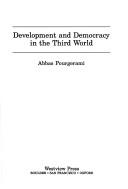
ISBN: 0813380057 9780813380056 Year: 1991 Publisher: Boulder (Colo.): Westview press,
Abstract | Keywords | Export | Availability | Bookmark
 Loading...
Loading...Choose an application
- Reference Manager
- EndNote
- RefWorks (Direct export to RefWorks)
Democracy --- developpement economique --- democratie populaire --- pays en voie de developpement --- economische ontwikkeling --- volksdemocratie --- ontwikkelingslanden --- Developing countries --- Economic policy --- Politics and government --- Developing countries - Economic policy. --- Developing countries - Politics and government. --- Democracy - Developing countries. --- Economic policy. --- Politics and government.
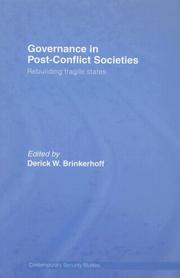
ISBN: 9780415771504 9780203965122 9781135983192 9781135983239 9781135983246 9780415463249 0415771501 Year: 2007 Publisher: London: Routledge,
Abstract | Keywords | Export | Availability | Bookmark
 Loading...
Loading...Choose an application
- Reference Manager
- EndNote
- RefWorks (Direct export to RefWorks)
NATION-BUILDING --- POSTWAR RECONSTRUCTION --- FAILED STATES --- Democracy - Developing countries --- Postwar reconstruction - Developing countries --- Conflict management - Political aspects - Developing countries --- National security - Developing countries --- Developing countries - Politics and government --- Democracy --- Postwar reconstruction --- Conflict management --- National security --- Developing countries
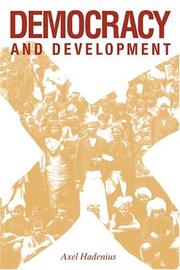
ISBN: 9780521416856 052141685X 9780511549731 9780521055307 Year: 1992 Publisher: Cambridge: Cambridge university press,
Abstract | Keywords | Export | Availability | Bookmark
 Loading...
Loading...Choose an application
- Reference Manager
- EndNote
- RefWorks (Direct export to RefWorks)
Democracy - Developing countries --- Developing countries - Politics and government --- Democracy --- 321 --- 321 Politieke organisatie. Staten als politieke machten. Regeringsvormen --- Politieke organisatie. Staten als politieke machten. Regeringsvormen --- Developing countries --- Politics and government. --- #SBIB:324H20 --- #SBIB:324H40 --- #SBIB:327.4H60 --- Politologie: theorieën (democratie, comparatieve studieën….) --- Politieke structuren: algemeen --- Derde wereld: ontwikkeling, sociale verandering: algemeen --- Political systems --- Developing countries: economic development problems --- Developing countries - Politics and government. --- Democracy - Developing countries.
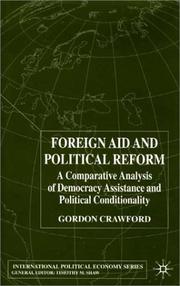
ISBN: 0333919823 9780333919828 Year: 2001 Publisher: Houndmills: Palgrave,
Abstract | Keywords | Export | Availability | Bookmark
 Loading...
Loading...Choose an application
- Reference Manager
- EndNote
- RefWorks (Direct export to RefWorks)
Development aid. Development cooperation --- Human rights --- Political systems --- Political sociology --- Developing countries --- Economic assistance --- Democracy --- Conditionality (International relations) --- Political aspects --- Politics and government --- Economic assistance - Political aspects - Developing countries --- Democracy - Developing countries --- Human rights - Developing countries --- Developing countries - Politics and government
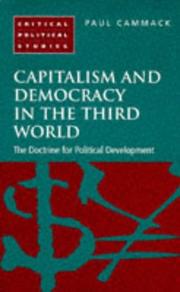
ISBN: 071850089X 0718500881 9780718500887 9780718500894 Year: 1997 Volume: *1 Publisher: London: Washington: Leicester university press,
Abstract | Keywords | Export | Availability | Bookmark
 Loading...
Loading...Choose an application
- Reference Manager
- EndNote
- RefWorks (Direct export to RefWorks)
Political development. --- Capitalism --- Democracy --- Développement politique --- Capitalisme --- Démocratie --- Developing countries --- Pays en développement --- Politics and government. --- Politique et gouvernement --- Political development --- Politics and government --- Développement politique --- Démocratie --- Pays en développement --- Capitalism - Developing countries --- Democracy - Developing countries --- Developing countries - Politics and government
Book
ISBN: 0300213913 9780300213911 9780300187809 0300187807 Year: 2015 Publisher: New Haven: Yale university press,
Abstract | Keywords | Export | Availability | Bookmark
 Loading...
Loading...Choose an application
- Reference Manager
- EndNote
- RefWorks (Direct export to RefWorks)
Many of the successful campaigns for national liberation in the years following World War II were initially based on democratic and secular ideals. Once established, however, the newly independent nations had to deal with entirely unexpected religious fierceness. Michael Walzer, one of America's foremost political thinkers, examines this perplexing trend by studying India, Israel, and Algeria, three nations whose founding principles and institutions have been sharply attacked by three completely different groups of religious revivalists: Hindu militants, ultra-Orthodox Jews and messianic Zionists, and Islamic radicals. In his provocative, well-reasoned discussion, Walzer asks why these secular democratic movements have failed to sustain their hegemony: Why have they been unable to reproduce their political culture beyond one or two generations? In a postscript, he compares the difficulties of contemporary secularism to the successful establishment of secular politics in the early American republic--thereby making an argument for American exceptionalism but gravely noting that we may be less exceptional today.
Democracy --- Political culture --- Secularism --- Religious fundamentalism --- Fundamentalism, Religious --- Fundamentalist movements, Religious --- Religion --- Ethics --- Irreligion --- Utilitarianism --- Atheism --- Postsecularism --- Secularization (Theology) --- Culture --- Political science --- Self-government --- Equality --- Representative government and representation --- Republics --- Democracy - Developing countries - Case studies --- Political culture - Developing countries - Case studies --- Secularism - Developing countries - Case studies --- Religious fundamentalism - Developing countries - Case studies

ISBN: 2865379701 9782865379705 Year: 2000 Volume: *1 Publisher: Paris : Karthala,
Abstract | Keywords | Export | Availability | Bookmark
 Loading...
Loading...Choose an application
- Reference Manager
- EndNote
- RefWorks (Direct export to RefWorks)
Political systems --- Eastern World --- Developing countries --- Civil government --- Commonwealth [The ] --- Doctrines politiques --- Idées politiques --- Idéologie politique --- Pensée politique --- Political science --- Political theory --- Political thought --- Politics --- Politieke wetenschap --- Science [Political ] --- Science politique --- Théories politiques --- Wetenschap [Politieke ] --- Democracy --- Comparative government --- Démocratie --- Institutions politiques comparées --- Comparative studies --- Etudes comparatives --- Democratization --- Démocratie --- Institutions politiques comparées --- Comparative studies. --- Democracy - Cross-cultural studies --- Democracy - Developing countries --- Democratization - Cross-cultural studies --- Democratization - Developing countries
Book
ISBN: 3319031422 3319031430 Year: 2014 Publisher: Cham : Springer International Publishing : Imprint: Springer,
Abstract | Keywords | Export | Availability | Bookmark
 Loading...
Loading...Choose an application
- Reference Manager
- EndNote
- RefWorks (Direct export to RefWorks)
Despite the large amounts of human and financial resources invested to foster democratic governance in developing countries, statistics show that the majority of these countries have not yet achieved significant improvements in living standards. While some regions make strides towards improving the living conditions of their citizens, Sub-Saharan Africa, for instance, is still trapped in poverty with more than 40% of its 600 million people living below the internationally recognized absolute poverty line of one US dollar per day. Poor governance and corruption should be highlighted as the most important systemic factors contributing to poverty in developing countries. As a result the institutional foundations of these countries are weakened, public funds are misappropriated, and policies and programs aimed at reducing poverty and fostering sustainable economic growth are undermined. It is therefore not surprising that a 2008 Transparency International report found a direct link between corruption and the failure of the societal institutions designed to achieve the Millennium Development Goals in the majority of developing countries. This book investigates the problems of democratic governance, particularly as they relate to corruption, and also whether democracy should be based on universal principles or local context and historical factors. It also analyses the rule of law, in promoting democratic governance and curbing corruption and if governmental, non-governmental organizations, and civil societies are effective in promoting democratic governance and curbing corruption. This book will go beyond identifying the challenges and offer plausible solutions that could be adapted to various developing countries. It is premised on the importance of bridging theory and practice, which has been lacking in most local and international development publications, making of interest to scholars and policy-makers alike concerned with public administration in developing countries.
Democracy -- Developing countries. --- Democracy. --- Developing countries -- Politics and government. --- Government - General --- Business & Economics --- Law, Politics & Government --- Economic History --- Political Institutions & Public Administration - General --- Sustainable development --- Democracy --- Comparative politics. --- Public administration. --- Development economics. --- Economics. --- Public Administration. --- Development Economics. --- Comparative Politics. --- Comparative political systems --- Comparative politics --- Government, Comparative --- Political systems, Comparative --- Political science --- Economics --- Economic development --- Administration, Public --- Delivery of government services --- Government services, Delivery of --- Public management --- Public sector management --- Administrative law --- Decentralization in government --- Local government --- Public officers --- Comparative government.

ISBN: 052141685X 052105530X 0511549733 Year: 1992 Publisher: Cambridge : Cambridge University Press,
Abstract | Keywords | Export | Availability | Bookmark
 Loading...
Loading...Choose an application
- Reference Manager
- EndNote
- RefWorks (Direct export to RefWorks)
This book is a thorough investigation into the requisites of democracy. Based on data from 132 sovereign states of the Third World, it first establishes a scale to measure the level of democracy existing in these countries. The author discusses various interpretations of the meaning of political democracy, and emerges with a specification of its essential elements which includes such elements as the holding of elections to central decision-making organs, and the maintenance of certain fundamental political liberties. Theories concerning the requisites of democracy are then examined in order to explain the manifest differences in the level of democracy among the states of the Third World. The author employs statistical techniques including regression analysis to test theories related to socio-economic conditions, demographic and cultural factors, and institutional arrangements. This book thus provides a wide-ranging examination both of the elements which constitute democracy, and of the factors which explain its varying prevalence.
Political systems --- Third World: economic development problems --- Developing countries --- Democracy --- #SBIB:324H20 --- #SBIB:324H40 --- #SBIB:327.4H60 --- 321 --- 321 Politieke organisatie. Staten als politieke machten. Regeringsvormen --- Politieke organisatie. Staten als politieke machten. Regeringsvormen --- Politologie: theorieën (democratie, comparatieve studieën….) --- Politieke structuren: algemeen --- Derde wereld: ontwikkeling, sociale verandering: algemeen --- Politics and government. --- Politics and government --- Developing countries - Politics and government. --- Democracy - Developing countries. --- Developing countries: economic development problems --- Social Sciences --- Political Science
| Listing 1 - 10 of 15 | << page >> |
Sort by
|

 Search
Search Feedback
Feedback About UniCat
About UniCat  Help
Help News
News